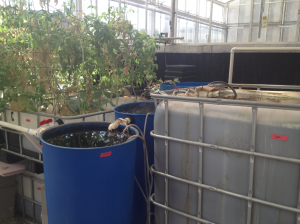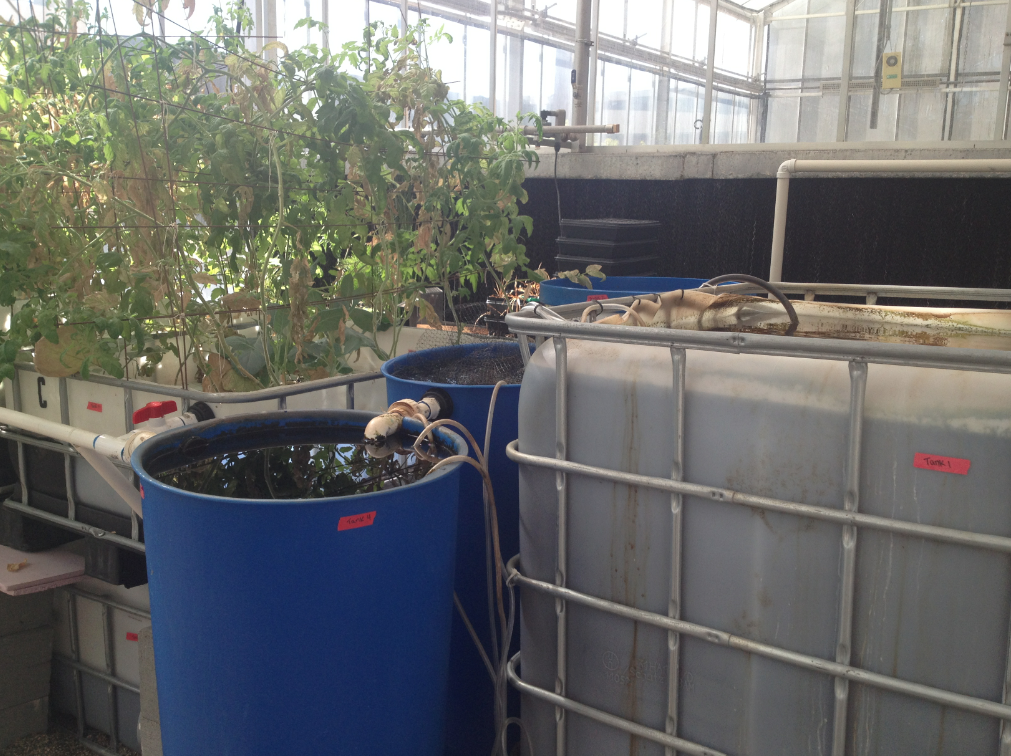A small operation in one of St. Thomas’ greenhouses might have big implications for developing countries.
Biology professor Gaston “Chip” Small and his classes are researching how to optimize a food production effort in Grace Village, Haiti, through a sustainable aquatic and plant system called aquaponics.
Aquaponics is essentially growing fish and plants together in a closed ecosystem where the fish waste provides nutrients to the plants and the plants clean the water for the fish. Gravity takes the nutrients to the plant base, then the filtered plant water is circulated back to the fish tank via an electric pump.

According to Small, this type of food production is beneficial to countries like Haiti as a “soil-less” alternative to traditional farming. The aquaponics system in Haiti is designed to provide food for an area orphanage, while the St. Thomas project is used to experiment and give feedback to the Haiti project.
“The rationale for doing this in Haiti in particular is because the soil is really poor,” Small said. “There are places where people farm, but (Grace Village) is a particularly infertile spot. In theory, you can grow a large amount of food in a small space with aquaponics.”
Small got involved with this project a little over a year ago while visiting a local aquaponics facility where Healing Haiti, a non-profit organization, had their prototype for the Haitian mission on display.
“We learned more about what they’re doing there and some of the issues that you can imagine a developing country like Haiti has,” Small said. “We’re going to try to do some experiments with my students here at St. Thomas that might feed into managing this system in Haiti more effectively.”
After viewing Healing Haiti’s prototype, Small said he was able to purchase the non-profit’s system and put it in the greenhouse for use at St. Thomas.
Senior Meaghan Hunt has been involved in Small’s class projects for over a year and said his research is groundbreaking.
“It amazes me that he has become involved with the Haiti aquaponics project because there isn’t really any other research being done,” Hunt said. “This will hopefully help the Haiti project to evolve and utilize the system so that it can have the highest food output possible.”
Since aquaponics is a fairly new technology, Small said there have not been many studies to determine the ideal elements for maximum production.
“So far they have not been able to grow as many vegetables as they’ve wanted, so they’re still trying to figure out what kinds of plants work well and what doesn’t,” Small said.
Some products the Haitian project has been able to successfully harvest include peppers, kale and tilapia that swim in the three tanks.
While the St. Thomas aquaponics system holds 600 gallons of water and houses 12 smaller tilapia, the Haitian facility holds 17,000 gallons and has around 1,200 bigger fish.
“Some things we can simulate in our experiments here at St. Thomas, and some things we can’t simulate quite as well,” Small said.
According to Small, one of the biggest challenges the project faces is becoming independent of U.S. assistance. Currently, the Haitian aquaponics facility requires many resources to be imported, such as fish food and diesel for the generator to pump the water.
“Ultimately it needs to be self-sufficient, but right now it’s pretty heavily subsidized in a lot of ways,” Small said.
Senior Rachel Sweet said the research experience is a great way for students to apply what they have learned in class to real world situations.
“This priority mirrors St. Thomas’ commitment to service and ‘advancing the common good’ which, to me, is incredibly important,” Sweet said.
Small said the project has potential, but admits researchers have some work to do.
“Right now there’s a lot of input, but my long-term goal is taking this project and weaning it from being supported by American donors and let it run on its own to be a real benefit for the community there,” Small said.
Molly Sigler can be reached at sigl1215@stthomas.edu.

